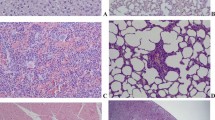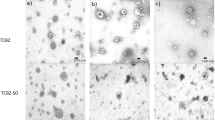Abstract
Two drugs widely used in the chemotherapy of fascioliasis, carbon tetrachloride and hexachloroethane, show very little activity against the immature, migrating forms of the fluke. The earliest age of the fluke against which these drugs are active occurs after migration of the parasite through the liver parenchyma, when the flukes are either in, or about to enter, the bile ducts.
This is a preview of subscription content, access via your institution
Access options
Subscribe to this journal
Receive 51 print issues and online access
$199.00 per year
only $3.90 per issue
Buy this article
- Purchase on Springer Link
- Instant access to full article PDF
Prices may be subject to local taxes which are calculated during checkout
Similar content being viewed by others
References
Hughes, D. L. thesis, Univ. London (1959).
Parfitt, J., and Kendall, S. B., Brit. Vet. J., 118, 1 (1962).
Lämmler, G., and Loewe, H., Arzn.-Forsch., 5, 497 (1955).
Lämmler, G., and Loewe, H., Arzn.-Forsch., 12, 15, 164 (1962).
Author information
Authors and Affiliations
Rights and permissions
About this article
Cite this article
WILLIAMS, V. Effect of 4,4′-Diaminodiphenylmethane against Fasciola hepatica in the Rabbit and in Cattle. Nature 198, 203–204 (1963). https://doi.org/10.1038/198203b0
Issue Date:
DOI: https://doi.org/10.1038/198203b0
This article is cited by
-
4-Cyano-2-iodo-6-nitrophenol: a New Fasciolicide
Nature (1966)
Comments
By submitting a comment you agree to abide by our Terms and Community Guidelines. If you find something abusive or that does not comply with our terms or guidelines please flag it as inappropriate.



